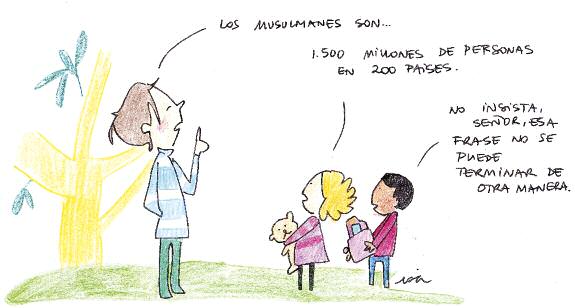 In the following article, published in the Spanish newspaper Diagonal, Ángeles Ramírez, anthropology professor at the Autonomous University of Madrid, refutes four common arguments employed when generating an Islamophobic discourse. As the author explains, this concepts are not only used by those actively promoting Islamophobia, who attack Islam and the Muslim population, but they are also used to legitimate their hate speech in the eyes of the rest of the population, who assimilates it and even justifies it.
In the following article, published in the Spanish newspaper Diagonal, Ángeles Ramírez, anthropology professor at the Autonomous University of Madrid, refutes four common arguments employed when generating an Islamophobic discourse. As the author explains, this concepts are not only used by those actively promoting Islamophobia, who attack Islam and the Muslim population, but they are also used to legitimate their hate speech in the eyes of the rest of the population, who assimilates it and even justifies it.
“Relying on an old analogy: only the Nazis carried out the extermination of the Jewish population in Europe, but the idea that they were an alien and corrupt race, which took advantage of the German population and that deserved to be excluded, was broadly shared by the German population of that time. The second point conditioned the first one. In the case of Islam, just some right-wing groups would lead a violent opposition in the streets against the opening of a mosque, for example. But the premises for these actions are the stereotypes about Islam: its link to violence, the potential fanaticism of Muslims and the lack of women rights. These principles are assumed by a big sector of the population, regardless of their political sign. All this is Islamophobia, understood as racism against the Muslim population.”
These four arguments, so commonly used, and yet sources of generalizations and reductionisms are:
1. “Muslims are…” Muslims are 1.570 million people and constitute a very heterogeneous group, which includes different countries, ethnic groups, and religious currents.
2. “Islam leads to violence. Muslims follow blindly their religious precepts.” This is a baseless generalization, encouraged by an Orientalist vision whose origin can be found in the colonial occupation, and backed nowadays by the media.
3. “Islam attacks women rights.” This generalization is a consequence of the experience of those countries that have manipulated Islam in order to defend their own misogynist and patriarchal intentions. Islam does not oppress women.
4. “Muslim women are forced to cover themselves with a hijab, therefore, in Europe, it has to be forbidden, so they can be freed from that oppression.” This assessment criminalizes a type of clothing, thus stigmatizing the women who wear it. “The curious thing is that these progressive stances end up defending that the State has to tell women how to dress, thus pretending to ‘emancipate’ them by taken away their citizen rights”.
Click here to read the full article. (In Spanish)















No Comments